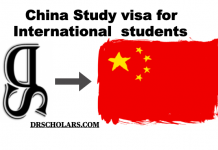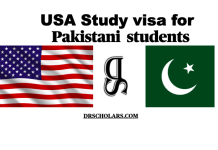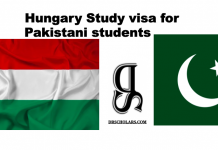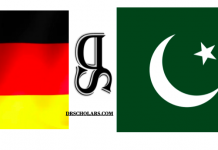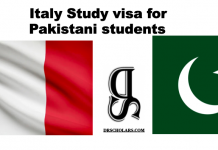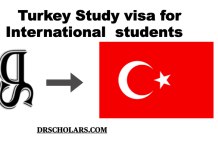Korea is one of the most educated countries globally which is a reason why there is an increasing demand for a Korean student visa.
If you are undertaking a full-time degree such as Bachelor’s, Master’s, or PhD in south korea, you must first get a Korean study visa & also need to apply for a residence permit later.
If you are wondering about the visa process, this ultimate guide will explain the whole process step by step.
Don’t miss out on the frequently asked questions at the end!
Find out about the step-by-step process of Korean Government scholarship.
Korean Student Visa
1. Types of Korean Student Visas
2. Processing Fees for Korea Student Visa
3. Processing Time for Korea Student Visa
4. Embassies & Consulates for Korean Student Visa
5. Documents Required to Apply for Korean Student Visa
6. How to Apply for a Korean Student Visa?
7. Interview Questions for Korean Student Visa
8. FAQS (Frequently asked questions)
Here is a detailed guide about KAIST Graduate Scholarship & Undergraduate scholarship.
1. Types of Korean Student Visas
The D-2 visa is a study visa for Korea. The Korean Government advises students entering Korea for study purposes to get a D-2 visa issued because it is specifically reserved for that purpose.
The duration of the validity of the D-2 visa is three months after entrance into Korea. There are different types of D-2 study visas for Korea.
These include the following:
- D-2-1 for Associate Degree
- D-2-2 for Bachelor’s Degree
- D-2-3 for Master’s Degree
- D-2-4 for Doctoral Degree
- D-2-5 for Research Study
- D-2-6 for Exchange Student
See the screenshot

Students can also find different details about different Korean visas here.
They can also use Visa Navigator for Korea.
Check our detailed guide about Saudi Arabia Study visas.
2. Korean student visa Fee
The processing fee for a single-entry Korean visa (90 days or less) is $40.
This visa is most commonly issued to foreign students.
The application fees for a single-entry Korean visa for 91 days or longer are $60 and $70 for a double-entry visa usable up to two times, and $90 for a multiple-entry visa.
3. Processing Time for Korean Student Visa
The processing time for a Korean study visa can vary from case to case. Various elements play a role in deciding how long the decision takes on a visa application.
The processing time may be affected due to the busy work schedules of embassies and consulates because they might receive more applications in some months than others.
The time can also be affected due to the nationality, visa type, or any other issue faced by the applicant during the application process.
Nevertheless, the standard time for the issuance of a D-2 student visa for Korea is 4-6 weeks.
Here is everything you want to know about Qatar study visas.
4. Embassies & Consulates for Korean Student Visa
The application process for study visas for Korea is conducted by Korean missions abroad which are their embassies or consulates.
You must apply for a visa to the embassy or consulate that is nearest to you because you will be called for a visa interview by that respective mission.
International Students can find their desired nearby Korean Embassy or consulate here.
Other important links for international students are the Ministry of foreign affairs and Study in Korea.
If You have any questions related to your Korean study visa or any other study visa, you can also contact us for a live one-on-one session.
Whatsapp Contact: +393512735708 [ps2id id=’Documents-Required-to-Apply-for-Korean-Student-Visa’ target=”/]
Check our Turkey study visa guide.
5. Documents Required for Korean Student Visa
5.2. Passport-size photographs
5.7. English Language Proficiency (IELTS) for Korean Student Visa
5.9. (COA) Certificate of admission from Korean University
5.10. Bank statement for Korean Student Visa
5.11. Health (Travel) Insurance
5.14. Receipt of Visa Processing Fee
5.15. Copy of Hotel Reservation & Flight Booking
5.16. Family Registration Certificate (FRC)
5.17. No Objection Certificate (Optional)
5.18. Police Clearance Certificate (Optional)
5.19. Certificates of extracurricular achievements
5.20. Corona Vaccination Certificates
5.21. Marriage and Childbirth Certificate
Check our detailed guide about Japan study visas.
5.1. Korean Student Visa Application Form
Carefully fill out the correct Korean D-2 visa application form & submit it.
The application form consists of various fields which include personal details, passport information, contact information, marital status and family details, education, employment, details of the visit, details of invitation, funding details, and declaration.
The students can access the application form for a student visa here.
They can also use Visa Navigator for Korea.
Students can also contact their Korean consulates if they have any queries.
Remember 90% of the students will need to apply for single-entry Korean visas (Costs $40).
Check our detailed guide about Spain’s student visa.
5.2. Passport-size photographs
The general picture format for a Korean student visa is the following.
A: Two recent (within 6 months) passport-size (35x45mm) photos.
B: White background with neutral facial expressions. (Unedited)
C: Avoid uniforms & the head should be 80% in the photo.
D: The applicant should look at the camera.
5.3. Valid Passport
A: A passport must have at least 18 months of validity from the date of visa application.
B: Applicants will also provide visa copies (if they have any).
C: The passport must have at least two blank pages.
D: All the previous passports must also be attached. (If they have any)
5.4. CNIC
A birth certificate and a National Identity card are mandatory for a Korean student visa.
5.5. Academic Documents
It includes all academic records & certificates.
A. Certificate & transcript of Bachelor’s (If a student is applying for a master’s program)
B. Certificate & transcript of Master’s (If a student is applying for a Ph.D. program)
C. Transcript (DMCs) of Metric & FSC and certificates (if a student is applying for a bachelor’s degree)
D. Proficiency certificate in English from the university.
E. Course summary which explains current courses & previous courses.
F. Provide two Recommendation Letters from your university along with the referee’s detail.
5.5.1. Translated Documents contain:
A. Confirmation from Translation Company/Translator
B. Translation Date
C. Name and Signature of the Translator
D. Translator’s Contact Details
NOTE:
The above-mentioned documents must be attested by respective universities and boards.
For example, in the case of Pakistan, it must be attested by IBCC, HEC, and MOFA (Ministry of Foreign Affairs).
IBCC authority is only responsible for the attestation of metric and inter documents.
Dear offices are present in Peshawar, Karachi, Lahore, Islamabad, and also in other cities of Pakistan.
HEC office attests to Bachelor’s, Master’s, and Ph.D. documents.
Other International students should attest their documents from their own respective ministries & authorities.
If you want to study in Hungary, check out our ultimate Hungarian study visa guide.
5.6. CV
CV is compulsory for the university admission process and optional for embassy interviews.
It should contain all the contact details and academic information.
Students can make a perfect Cv in Europass here in under a few minutes.
5.7. English Language Proficiency (IELTS) for Korean Student Visa
There are no specific mentions of IELTS for Korean student visas on their immigration websites. However, IELTS is mostly compulsory for almost all public Korean universities.
And Having a strong band in IELTS certainly increases your chances of getting a student visa.
For Bachelor’s an overall 5.5 band while for a Master’s 6.5 band is enough.
Some universities like Seoul National University require a 7 band for some specific courses, while for some other universities like Chonbuk National University, a 5.5 band is enough.
If students can’t do IELTS they should provide the alternative PTE or TOFEl etc.
Some Korean universities even accept English proficiency certificates, if the background education of the applicant is entirely in English.
5.8. Statement of Purpose/Letter of Motivation/Cover Letter
This document comprises the following information about the student
A. Previous academic record
B. Employment Status
C. Relationship with your home country
D. Immigration History
E. Economic conditions of the applicant
A statement of purpose (SOP) & letter of motivation (LOM) are almost the same thing & could be interchangeable.
In this letter, you are asked to write about your personal and professional reasons why are you applying for a course or the scholarship and what is your intention of traveling to Korea.
The maximum length of this letter is three pages, But it is advised to make it short & concise to one page.
5.9. (COA) Certificate of admission from Korean University
It is an acceptable proof of study, internship, and training program at a higher institution in Korea, and must be signed by the Dean or president of the institute.
This acceptance letter should mention:
That the applicant is accepted to a study program at a Korean university.
It also includes accommodation proof and details of the organization supporting the student, plus the duration of studies.
Students should also attach the scholarship details if they are getting any.
The applicants must submit this acceptance letter to apply for the D-2 student visa.
The annual fees for a full-time degree program in Korea can be anywhere in between $1,600 and $10,000.
If you still haven’t applied to a university in Korea, you can find a list of some top universities through this link.
5.10. Bank statement for Korean Student Visa
The applicants are required to prove their financial means to be eligible for the Korean student visa. The proof can be provided through a proper bank statement.
International students are advised to provide a bank statement of at least 10,000 USD if they are planning to apply for bachelor’s or Masters.
It’s evidence that the applicant is capable of covering his/her expenses for at least one year.
Bank Statement must be signed and stamped by the bank officer. The bank account must be in the name of the student.
If the Student submits the bank statement of the parents then they have to provide a relationship certificate too.
This amount should be shown irrespective of the university fee.
In the case of a scholarship or grant, there is no need of showing a bank statement.
but a scholarship letter from the university is enough.
5.10.1 SPONSORSHIP
In the case of sponsorship, the applicant should make an Affidavit of the sponsor, in which they will state their relationship.
The sponsor is also required to show the tax return for the last two years.
Property Details & other Income sources of the sponsor are also required.
If you want to study in China, check out our ultimate Chinese study visa guide.
5.11. Health (Travel) Insurance for Korean study visa
International students are advised to have private or public health (Travel) insurance which can cover their first few months in case of any medical & Pharmaceutical assistance or emergency.
The insurance must guarantee the coverage of repatriation costs and Covid-19 treatment.
Students are advised to regularly contact their local Korean embassies in case of any queries.
5.12. Medical certificate
Students must do a medical examination and show previous medical history about medication and illness.
They must provide test proof of Tuberculosis and Hepatitis A and B. (Incase of some countries)
Students make sure to regularly contact the embassy in case of any queries.
5.13. Proof of university Legal Fees
It is a receipt or proof of the “first-semester fee” or the “fee for the whole year”.
when students pay the Annual fee, University will send them a COA (certificate of admission).
Students must also save all the online fee invoices & attach them to their documents while submitting an application for a Korean student visa.
5.14. Receipt of Visa Processing Fee
The student will pay a non-refundable visa fee and fill out the form.
The processing fee for a single-entry Korean visa (90 days or less) is $40.
This visa is most commonly issued to foreign students.
The application fees for a single-entry Korean visa for 91 days or longer are $60 and $70 for a double-entry visa usable up to two times, and $90 for a multiple-entry visa.
5.15. Copy of Hotel Reservation & Flight Booking
The booking confirms the arrival date in a particular country. The hotel reservation shows that a student researched the process.
The host university should mention in their admission letter if they provide accommodation for the student.
The student can also provide a rental home contract.
5.16. Family Registration Certificate (FRC)
A family registration certificate (FRC) is a document that tells that the family record of the student is complete in the database of the home country.
This document contains details of the name and information of the parents and siblings.
This document is very much important in case of extending a residence permit in Korea.
International students can get it from their local ministries & authorities.
Pakistani students can get FRC through NADRA offices in Pakistan.
They can also apply for it online.
5.17. No Objection Certificate (Optional)
It also varies from country to country. It is compulsory for some countries and known as NOC.
This letter will include that the student is applying for a student visa to Korea, And will return to the country after completing their education.
NOC must be written by the Dean or HOD of the university.
5.18. PCC (Police Clearance Certificate) for Korean Student Visa
International students who want to apply for a Korean student visa (D-2) must submit a document showing a history of a criminal record.
This document is issued by the country of your residence within five months of starting the visa application.
Generally, PCC can be issued by your local security police station or many international students can also make it online.
Indian students can make it through Passport seva, and Pakistani students can make it in “Police Khidmat Markaz” or the ICTP app or the ICTP website.
Here is our detailed guide about Sweden study visas.
5.19. Certificates of extracurricular achievements
These certificates could include internship certificates and experience letters.
The embassy gives extra value to these certificates.
5.20. Corona Vaccination Certificates
Students must complete the COVID-19 vaccination before the interview appointment at the embassy.
The administered vaccines are listed by the WHO (World Health Organization).
5.21. Marriage and Childbirth Certificate (Optional)
The embassy may ask about Childbirth Certificates and marriage certificates.
It is better to bring both childbirth and marriage certificates along with you for a student visa interview.
Check our detailed guide about Finland student visas.
6. How To Apply For a Korean Student Visa?
International students can follow these simple four steps to apply for a Korean study visa.
6.1. Apply to Korean Universities and Get COA
The first step for you is to apply to different Korean universities. For this, you will need to shortlist the universities that offer courses related to your field and select the universities that suit you the best. You can search for Korean universities through this link.
You must get a COA (Certificate of admission) from Korean University, Without being admitted to a university, you cannot proceed to the next step.
Check our detailed guide about Finland student visas.
6.2. Prepare Your Documents to Apply for Korean Study Visa
After getting an acceptance letter, you need to start preparing the list of the documents we mentioned above in detail.
6.3. Fill out the application form & pay the fee for Korean Visa
Carefully fill out the correct Korean D-2 visa application form & submit it.
The application form consists of various fields which include personal details, passport information, contact information, marital status and family details, education, employment, details of the visit, details of invitation, funding details, and declaration.
The applicants can access the application form for student visas here and can download the Korean visa application form through this link.
They can also use Visa Navigator for Korea.
Students can contact their Korean consulates if they have any queries.
Remember 90% of the students will need to apply for single-entry Korean visas (Costs $40).
6.4. Set an appointment with your embassy or consulate for your visa interview
After filling out the online visa application form, you will have to appear for a visa interview. In this interview, you will submit the supporting documents and a copy of the application form to the embassy or consulate.
The list of possible interview questions is given below. Prepare the answers to all of them according to your need.
Here is everything you want to know about Turkey Burslari Scholarships.
7. Interview Questions for Korean Student Visa
There is common questions student face during their visa interview.
These questions may vary from profile to profile and are given below:
Name of the student & questions about previous educational qualification?
What is your purpose for going to Korea?
Did you already search for opportunities in your home country?
Where is the university located in Korea?
Who is your sponsor? What is your relationship?
What is your course structure or Course summary?
Which course you will start at the university?
Why did you choose this university and subject?
How will this course shape your career?
How did you find this university?
What are your plans after the completion of the course?
Who advised this accommodation and how much will be?
When will your course start?
Why did you choose Korea and not another country?
What is the capital of Korea and the spoken language?
Can you name other cities where famous universities exist?
Did you do an examination or a test made by the university?
Please name the person with whom you are in contact at the university.
Where will you stay in Korea?
How much do you expect to spend per month in your destination city? On your rent, food & fee.
Is there any information to tell us to support your application?
Here is our detailed guide about the Netherlands Study visa.
8. FAQs about Korean student visa
Q. Can I complete the whole application process for a D-2 visa online?
Ans. You can only fill out the application form online and submit it. The applicants can access the application form for student visas here and can download the Korean visa application form through this link.
However, you will not be able to proceed further with the process through online methods. You will have to appear at a Korean embassy or consulate for the submission of your application for the Korean study visa and other supporting documents.
It is also important for you to appear physically for an interview if you are looking for a student visa for Korea.
Check our detailed guide about Norway student visas.
Q. What are the reasons for the rejection of a Korean study visa? and when can I reapply?
Ans. There may be different reasons for the rejection of your Korean student visa. It may be due to an incomplete application, weak communication skills during the interview, detection of false information, bad travel history, or weak reasoning regarding your purpose to visit Korea.
However, even if you have been rejected for a visa to Korea, you can file the application again.
This application can be filed after three months of the rejection with a new application fee.
Check our detailed guide for Denmark study visas.
We try to cover each & everything about the topic, but if you still have any questions please don’t hesitate to ask us in the comments.
If You have any questions related to your Korean study visa or any other study visa, you can also contact us for a live one-on-one session.
Whatsapp Contact: +393512735708
